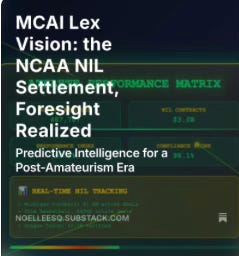MCAI Lex Vision: the NCAA NIL Settlement, Foresight Realized
Predictive Intelligence for a Post-Amateurism Era
On June 6, 2025, the US District Court for the Northern District of California approved a landmark $2.8 billion settlement in House v. NCAA, authorizing colleges to directly compensate athletes for their name, image, and likeness (NIL). Judge Claudia Wilken’s ruling redefined the structure of college athletics and formally ended the legal fiction of amateurism.
This decision enables institutions to allocate up to $20.5 million annually for athlete compensation, with retroactive pay awarded to former athletes dating back to 2016. Schools now enter a market-based environment in which athletic labor carries both legal recognition and economic value.
MCAI’s Foresight: A May 2025 Prediction
Just one month before the ruling, in May 2025, MindCast AI (MCAI) published a simulation anticipating this very inflection point. We didn’t wait for a court order to recognize the structural failure of the NCAA’s amateurism model—we diagnosed its legal and economic vulnerabilities in real time.
🔗 Read the full simulation: https://noelleesq.substack.com/p/ncaa-nil
Key predictions from the simulation included:
Legal vulnerability stemming from denial of compensation despite revenue growth
Retroactive liability as a function of institutional delay and antitrust precedent
The need for schools and athletes to adopt new financial and governance structures
Rather than offering abstract theories, MCAI’s model laid out tangible legal, economic, and reputational risks. These were modeled using four proprietary Vision Functions:
Legal Vision – Identified antitrust exposure and judicial pressure points
Economics Vision – Modeled incentive misalignments and compensation thresholds
Trust Vision – Tracked erosion of institutional credibility under public scrutiny
Legacy Vision – Framed the NCAA’s resistance in terms of historical systemic inertia
These projections weren’t speculative—they were structured foresight. And today, they are legal reality.
Institutional Readiness in a Post-Settlement World
The ruling creates both an obligation and an opportunity for universities. MCAI helps schools transition from reactive posturing to proactive strategy.
Universities must now develop policies, operational plans, and communications strategies that reflect the new compensation landscape while preserving legal defensibility and public trust. Our simulations enable institutions to make decisions rooted in foresight rather than reaction.
Services for Universities
Compliance Simulation: Model potential legal exposure and reputational risks in response to evolving NIL policy landscapes.
Revenue Architecture Planning: Design defensible and sustainable athlete compensation frameworks aligned with Title IX and antitrust standards.
Governance Foresight: Refine institutional policies to withstand legal, ethical, and public pressures using recursive modeling.
Reputational Scenario Testing: Anticipate media narratives, advocacy campaigns, or litigation risks before they emerge.
By applying MCAI’s Vision Functions, universities can shift from short-term fixes to long-term solutions.
Athlete-Centric Intelligence for a Market Era
As institutions adapt to the new legal framework, student-athletes face equally transformative shifts. NIL has introduced volatility alongside opportunity, and athletes now operate in a high-stakes ecosystem where every decision carries professional implications.
MCAI equips athletes and their advisors with tools to project and protect value. We go beyond immediate transactions to simulate how early decisions shape long-term identity, stability, and leverage.
Services for Athletes and Advisors
Deal Forecasting: Evaluate NIL contract structures for long-term value, regulatory impact, and personal risk.
Narrative and Reputation Analysis: Anticipate how digital behavior and media exposure affect earnings and career opportunities.
Financial Futures Planning: Simulate various income deployment strategies—from investments to educational advancement to generational wealth models.
Eligibility Risk Modeling: Understand how decisions affect scholarship status, team contracts, and compliance limits.
By simulating tradeoffs in advance, MCAI gives athletes and their teams the ability to make strategic—not reactive—choices.
The Path Forward
This isn’t the beginning of compensation—it’s the beginning of institutional accountability. Schools, athletes, and their advisors must now operate within a live, regulated marketplace. MCAI provides the simulation capacity to act—not just respond. By forecasting consequences before they unfold, we help our clients lead in an environment where stakes are public, legal, and irreversible.
The stakes are no longer theoretical. A school’s NIL governance is now part of its brand. An athlete’s online choices can become a reputational asset—or liability. Each contract is a case study in risk. Foresight is no longer optional.
“This is no longer amateur sport. It’s institutional performance under public, legal, and moral pressure.”
— MCAI NCAA NIL Simulation, May 2025



